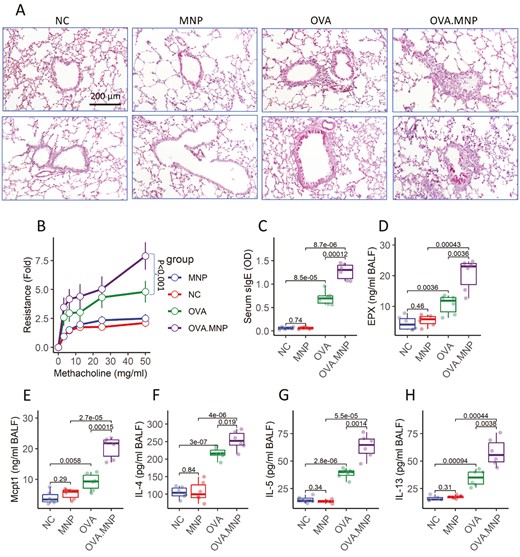-
Views
-
Cite
Cite
Lihua Mo, Xinxin Wang, Yun Liao, Yu Liu, Aifa Tang, Jing Li, Pingchang Yang, Environmental pollutant 3-methyl-4-nitrophenol promotes the expression of oncostatin M to exacerbate airway allergic inflammation, Clinical and Experimental Immunology, Volume 218, Issue 2, November 2024, Pages 111–119, https://doi.org/10.1093/cei/uxae078
Close - Share Icon Share
Abstract
Asthma exacerbation is a common clinical occurrence. The causal factors are not fully understood yet. Environmental pollution is linked to asthma exacerbation. The objective of this study is to elucidate the role of 3-methyl-4-nitrophenol (MNP), an environmental pollutant, in asthma exacerbation. In this study, an airway allergy mouse model was established with ovalbumin as a specific antigen with or without the presence of MNP. The results showed that, in a mouse model, the intensity of airway allergy was significantly increased by exposure to MNP. RNAseq results showed an increase in endoplasmic reticulum (ER) stress-associated molecules and the Osm expression in airway epithelial cells of mice with airway allergy. Exposure of epithelial cells to MNP in culture induced the expression of oncostatin M (OSM) and ER stress associated molecules. The OSM receptor was expressed by macrophages. OSM could drive macrophages to produce tumor necrosis factor-α (TNF-α). Inhibition of PERK, one of the key molecules of ER stress, or depletion of OSM receptor in macrophages, could effectively attenuate the MNP/ovalbumin protocol induced airway allergy. To sum up, by promoting ER stress, environmental pollutant MNP can cause airway epithelial cells to produce OSM. The latter induces macrophages to produce TNF-α, which can exacerbate airway allergy.






